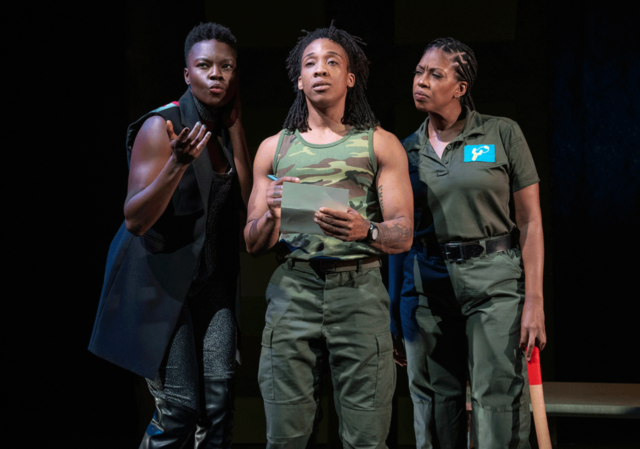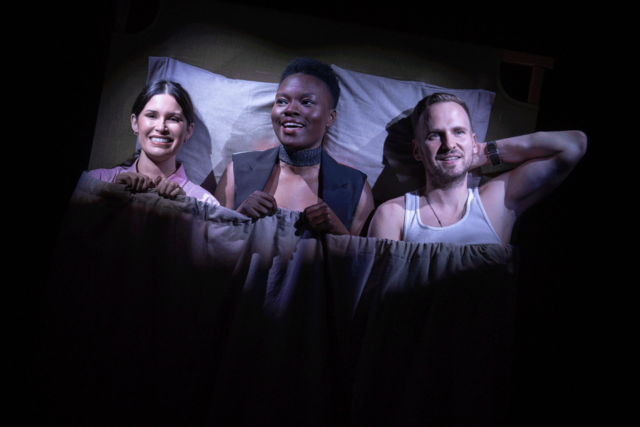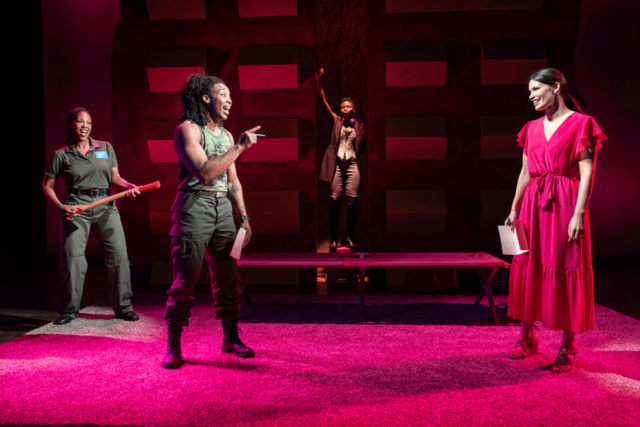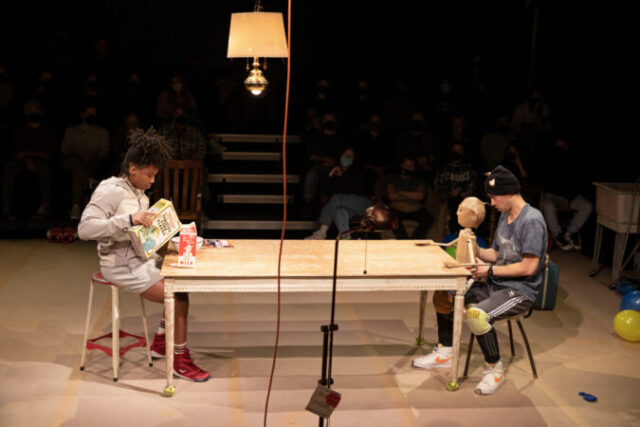
An Angel (Shaunette Renée Wilson), Lt. Shane Horne (Esco Jouléy), and Dr. Jess O’Nope (Marinda Anderson) seek out latest merryment from Hansol Jung (photo by Joan Marcus)
MERRY ME
New York Theatre Workshop
79 East Fourth St. between Second & Third Aves.
Tuesday – Sunday through November 19, $65-$75
www.nytw.org
Rising star Hansol Jung finishes a busy 2023 with her third production, Merry Me, continuing at New York Theatre Workshop through November 19. The year began with the exhilarating and unpredictable Wolf Play at MCC, followed by the confusing and overly self-referential Romeo and Juliet. Merry Me falls somewhere in between, but it is certainly worth catching before it closes.
As the audience enters the theater, songs are blasting through the speakers, by Melissa Etheridge, Peaches, and Tegan & Sara, all longtime lesbian faves. “Do you like my playlist? You’re welcome,” says our host and narrator, the Angel (Shaunette Renée Wilson) from Angels in America, to open the show.
Merry Me mixes Tony Kushner, Greek tragedy (Aeschylus’s Oresteia, Homer’s Odyssey), William Wycherly’s seventeenth-century Restoration comedy The Country Wife, and Shakespeare into a frenetic tale about sex as power. It takes place on a naval base camp on a “Naval basecamp of A Nation’s most prestigious navy on an Island not far from Another Nation’s most vulnerable coast cities,” wonderfully depicted by set designer Rachel Hauck as a wall of tents as if seen from high above. A small door sits at stage right, a military foot locker stage left. Above are two white clouds amid a blue sky.
There’s a bit of a furor at the encampment, where an electric blackout is hampering the navy’s ability to defend itself. Curiously, the only devices that work are vibrators. Lt. Shane Horne (Esco Jouléy), known as “God’s gift to lady parts of all shapes, colors, and vintages,” is just out of the brig, having served time for bedding Gen. Aga Memnon’s (David Ryan Smith) wife, Clytemnestra (Cindy Cheung). The androgynous Horne, inspired by The Country Wife womanizer Harry Horner, looks fabulous in a camouflage tank top that reveals bulging muscles and tattoos. Horne and their therapist, Dr. Jess O’Nope (Marinda Anderson), who has trouble making decisions — her name is a riff on “yes or no” — concoct a plan in which the doctor will falsely report that “Lieutenant Shane Horne has been zapped, nuked, and lobotomized and returned to the world as Straight as a Road through Nevada!” Thus “converted,” Horne will be able to pursue, unabated, their “merries,” referring to orgasms.
Meanwhile, the general’s son, Pvt. Willy Iphigenia Memnon (Ryan Spahn), is trying to assert his military acumen with his father and his sexual prowess with his wife, Mrs. Sapph Memnon (Nicole Villamil). “I’m a woke white man,” he tells Dr. O’Nope. “I can come to pretend to understand extremities I do not fully comprehend by mansplaining and then apologizing. . . . What if I have been conditioned all my life to believe I am excellent above all other types of humans while not really being trained to work as hard? What if I am actually quite medium in talent, tenacity, and general interestingness and I know I have not developed a mental capacity to bridge the discrepancy between the genius I self-identify to be and the mediocre lump of ego that I actually am?”
As the apt-named Willy struggles with his conscience, Horne keeps up their search for pleasure, demanding, “I want my orgasm.”

Mrs. Sapph Memnon (Nicole Villamil) and Pvt. Willy Memnon (Ryan Spahn) are joined by a surprise guest (Shaunette Renée Wilson) in Merry Me (photo by Joan Marcus)
“The principal concern for women is not having an orgasm. But a woman has to take responsibility for her own orgasms,” Dr. Ruth said in 2010. Merry Me is, well, like an orgasm. Sometimes it explodes, sometimes it disappointingly falls flat, and other times it teases, tickles, and titillates.
The ninety-minute show can’t quite find its center, although it does occasionally locate its G-spot; Jung and director Leigh Silverman (Grand Horizons, On the Exhale), her regular collaborator, along with the cast, are having an absolute blast, which is infectious up to a point. Aficionados of Greek drama may enjoy the Homeric references sprinkled liberally throughout, but the narrative can get overwhelmed by repeated jokes, too many pop-culture references, and a nearly endless stream of double entendres — “It’s my fault, General. I have distracted your dear wife. I asked her to come,” Horne explains — while also having a lot to say about gender, sexuality, war, and the theater itself. Sometimes less is more, as with the navy’s small insignia, a slingshot, comparing sexual freedom to David’s battle with Goliath.

Lt. Shane Horne (Esco Jouléy) makes her case in wild and woolly Merry Me (photo by Joan Marcus)
Alejo Vietti’s costumes counter military fatigues with the blue-and-white outfit worn by Clytemnestra and the red dress adorning Sapph, a sly tip of the cap to America, along with the Angel’s fab getup, which is dazzling. Barbara Samuels’s lighting and Caroline Eng and Kate Marvin’s sound are bold and brash.
The excellent cast is led by Shaunette Renée Wilson (La Race, The Resident), who makes a spectacular appearance as the Angel, and Jouléy (Wolf Play), who is likely to turn you on as Horne no matter your orientation. Anderson (You Will Get Sick, Sandblasted), Cheung (Catch as Catch Can, Golden Child), Smith (Arden of Faversham, The Death of the Last Black Man in the Whole Entire World AKA the Negro Book of the Dead), Spahn (Moscow Moscow Moscow Moscow Moscow Moscow; Jane Anger, or . . .), and Villamil (Wolf Play, Lessons in Survival) provide solid support, at the ready for whatever is to come.
Merry Me makes for some fine merriment, even if the ending is a bit, er, anticlimactic.
[Mark Rifkin is a Brooklyn-born, Manhattan-based writer and editor; you can follow him on Substack here.]


